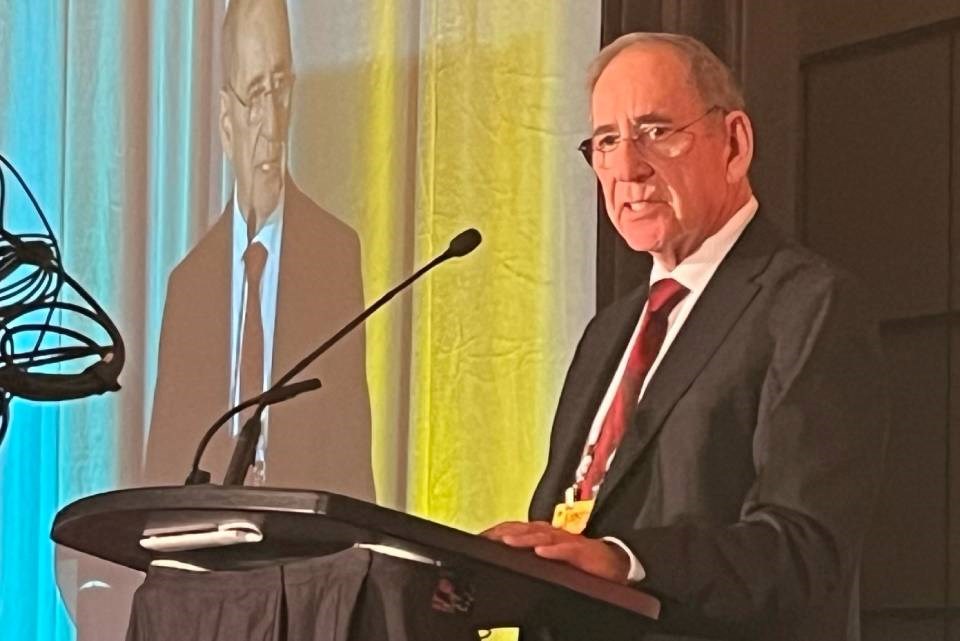As Canada looks to create new economic opportunities, the head of the First Nations Financial Management Board (FNFMB) believes Indigenous peoples have a significant role to play, to the benefit of the entire country.
“Indigenous economic development is good for all Canadians,” said Harold Calla, executive chair of the Vancouver, B.C.-based organization and a member of the Squamish Nation.
“It reduces the cost of poverty in First Nation communities. It supports the retooling of the Canadian economy, and it will support employment opportunities for non-Indigenous people.”
Calla was speaking from Timmins, where he joined hundreds of First Nations peoples from across northeastern Ontario this week for the inaugural Northeastern Ontario First Nations Economic Development Summit.
Held Sept. 10-11 at Cedar Meadows, the event is being hosted by the FNFMB and Apitipi Anicinapek Nation, formerly Wahgoshig First Nation.
Over two days, participants heard from keynote speakers, participated in discussions and networked around key topics on financing solutions, regional success stories, critical minerals, nation-to-nation engagement, and building capacity.
Launched in 2006 following the passage of the First Nations Fiscal Management Act, the First Nations Financial Management Board supports First Nations in developing and implementing good governance and finance practices.
That includes building capacity in financial management and exercising their fiscal powers, as well as gaining access to capital so they can take on new economic opportunities beyond the constraints of the Indian Act.
More opportunities are arising as a result of a “new economic order” that Canada is looking to be part of following the introduction of U.S. trade tariffs, Calla said.
“We’re now at a point where [Canada] has recognized the need to be able to support [First Nations] in business economic participation in major projects,” he said.
“The Government of Canada is going to have to support First Nations’ ability to participate in a meaningful way in those economic opportunities by providing them with supports for administrative capacity, and to provide supports for access to capital in the order of magnitude that these projects are now demanding.”
Calla, who served on the board of the Trans Mountain Pipeline project, said he witnessed firsthand the impact major projects, such as that one, can have on local Indigenous communities, both in the consultation phase and in procurement.
Of the $34-billion cost to build the pipeline, First Nations entities and joint ventures secured $6 billion worth of contracts, Calla said.
“That created a huge opportunity and a huge economic benefit for First Nations to be able to put their people to work, get them trained, some of them becoming Red Ticketed tradesmen through that process, as well as now looking as an equity participation,” he said.
He also pointed to the 2021 purchase of Nova Scotia’s Clearwater Seafoods by the Mi’kmaq Coalition, which is comprised of seven Mi’kmaq communities in Nova Scotia and Newfoundland. It’s now become the largest seafood company on the East Coast.
“So there are many, many benefits that come from having First Nations involved in multiple facets of the economy, but that gets spearheaded by the ability to have access to capital, which the government needs to stand behind, and to create the kinds of entities that other countries have,” he said.
In Timmins, the Northeastern Ontario First Nations Economic Development Summit provides a space for First Nations to start talking to each other and looking at ways to move forward for the betterment of their people.
“First Nations accept that the status quo isn't good enough for them or their communities. We want to get rid of the drug and alcohol problems, the suicides. We want clean water; we want housing,” Calla said.
“We have to do all of those things, and we can't rely on the transfer payments of Canada to do that.
“We need to engage in the Canadian economy, develop own-source revenue, and not only employ our people, but employ the non-Indigenous community in the regions in which we live.”




